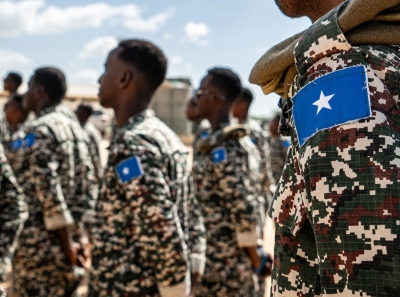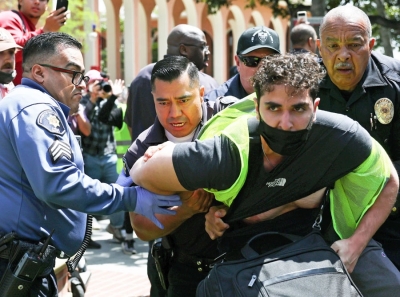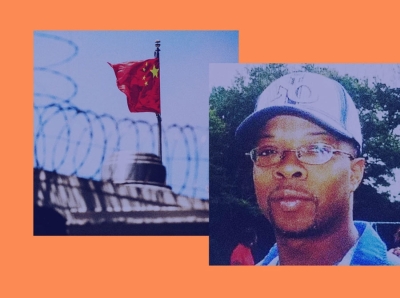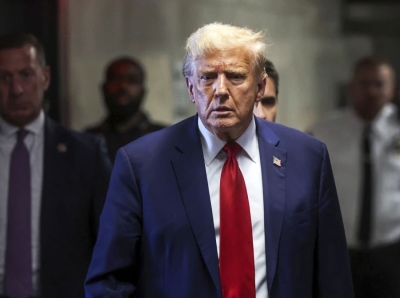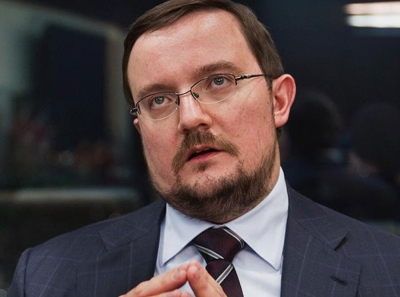Europe under pressure over war in the Middle East
The attack on Israel by radical Islamic Hamas and the reaction of the Israeli military are prompting fears of a further escalation in the region. The EU is under pressure to take a clear stance. A look at Europe’s commentaries reveals the challenges Brussels and the individual member states face.
Brussels must decide on its position
The current escalation of violence requires a clear stance from the EU, Europe correspondent Philippe Jacqué writes in Le Monde:
“As a diplomat in Brussels pointed out, ‘there are as many positions on the Middle East conflict in Europe as there are member states’. A broad spectrum of diplomatic positions, from countries that support Israel unconditionally to others that have a much more critical stance and are more interested in the question of the peace process. ... However, the resumption of the cycle of violence in Gaza is now forcing Europeans to re-engage diplomatically in an area that is part of their neighbourhood. Because the war and the risk of a humanitarian disaster could have immediate repercussions.”
Don’t postpone the only realistic solution
Philosopher Massimo Cacciari demands in La Stampa:
“It would be insane to believe today that after the Hamas attack and the Israeli reaction — without risking an uncontrollable expansion of the war — we can continue to put off the only possible solution: the creation of a genuine Palestinian state in the territories already defined by UN resolutions and which Israel continues to occupy, in exchange for a clear and definitive recognition of the state of Israel itself. ... In this way, Israel itself is defended, not through uncritical and unconditional support of its governments, whatever they intend to do.”
Internal divides exacerbated
The war in the Middle East is also fuelling tensions within European societies, fears Corriere della Sera:
“The key country is France. Ten airports have been closed. The palace at Versailles has been evacuated three times due to terrorist alerts, as has the Louvre. ... Emmanuel Macron has six million Muslims in his country, many of whom are already pretty angry. And he has a far right which between Le Pen and Zemmour polls at over 30 percent. Let’s not kid ourselves: they may be sovereignists (as if Macron wasn’t) and anti-globalist, but the main factor fueling the parties of Marine Le Pen and Éric Zemmour — which is not called Reconquête [reconquest] for nothing — is immigration, and Islamic immigration in particular.”
Moral authority in jeopardy
El País criticises Ursula von der Leyen’s trip to Israel:
“Some governments didn’t feel represented and made this clear: absolute condemnation of Hamas’s attacks, but Israel’s legitimate defence must respect international law. ... For Germany, Israel’s security is a matter of state. ... In Spain, the Israeli embassy accused government members of aligning with Hamas. In France, La France Insoumise refused to classify Hamas as a terrorist group. The issue is developing into a clash of cultures. The European Council has now defined a common position. ... If Brussels does not condemn Israel’s cutting off of Gaza’s water supply, the EU will lose its moral authority. We must return to the balance that Von der Leyen disrupted.”
Spain’s left undermining European unity
El Mundo finds it scandalous that Spain’s Minister of Social Affairs Ione Belarra of the Podemos party called for pro-Palestinian demonstrations:
“The gravity of the war in the Middle East, the risk of a new wave of jihadist attacks in Europe and its current EU presidency oblige Spain to take a leading role in this conflict. ... It is unacceptable that we have become the first European partner to clash with the country that was the victim of the Hamas attack. ... The participation of the extreme left in the government undermines Spain’s international reputation and is contrary to the position of the most important European capitals. ... At a time when the terrorist threat in Europe has increased after the jihadist attack in Brussels we need democratic unity.”
Crack down on antisemitism
Politicians and society in Germany and Austria must set limits for antisemitic activists, says Der Standard with regard to the debate on demonstration bans:
“Since Hamas’s long-planned terrorist attack on Israel, the number of anti-Semitic and anti-Israeli incidents in Germany and Austria has skyrocketed. New official figures from Germany even show a threefold increase compared to the previous year. ... Politics and society must put antisemitic activists in their place and take action against them with all the legal means available to a democratic constitutional state.”
Germany’s problematic culture of debate
In his speech at the opening of the Frankfurt Book Fair, Slovenian philosopher Slavoj Žižek condemned Hamas’s terrorist attacks but said that the concerns of the Palestinians must also be considered. For Dnevnik, the fact that he was heavily criticised is emblematic of the German debate on the subject:
“Germany’s Minister of Culture Claudia Roth made clear [in her speech] what message the Fair sends: as if a book fair were not a forum for democracy, not a safe place for debate, but an ambassador for Germany’s collective-guilt-ridden politics. Then Žižek explained to the shocked visitors that the Palestinians are not Hamas. ... Only when an opposing point of view can be expressed can a debate develop. ... And only when a debate develops does democracy function. We can only thank Žižek.”


